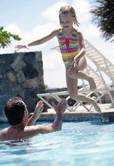 |
 |
 |
||
    |
||||
|
||||

Swimming Lessons Don't Increase Drowning Risk, Study Says
But experts warn parents that instruction alone is no guarantee|
|
HealthDay
By Robert Preidt
Monday, March 2, 2009
 MONDAY, March 2 (HealthDay News) -- Enrolling young children in swimming lessons doesn't increase their risk of drowning, says a study that might dispel concerns among some health professionals that swimming lessons could actually increase drowning risk by making parents and caregivers less vigilant when youngsters are in and around water.
MONDAY, March 2 (HealthDay News) -- Enrolling young children in swimming lessons doesn't increase their risk of drowning, says a study that might dispel concerns among some health professionals that swimming lessons could actually increase drowning risk by making parents and caregivers less vigilant when youngsters are in and around water.
U.S. government researchers analyzed data on drownings among those 1 to 19 years old and compared them with a control group of youths who didn't drown. Of the 61 children ages 1 to 4 who drowned, 2 (3 percent) had received swimming lessons, compared with 35 of 134 (26 percent) of the same age in the control group.
"From our calculation, we are confident that swimming lessons do not increase drowning risk in this age group and likely have a protective effect," the study's first author, Dr. Ruth A. Brenner, of the Division of Epidemiology, Statistics and Prevention Research at the National Institute of Child Health and Human Development, said in a government news release.
Of the 27 children ages 5 to 19 years old who drowned, 7 (26 percent) had taken swimming lessons; among the controls, 42 of 79 (53 percent) had taken lesson. Though the difference between the two groups wasn't statistically significant, the findings suggest that swimming lessons also help protect children in this age group, the researchers said.
Though they can help, swimming lessons alone aren't enough to fully protect children from drowning.
"In our study, many of the children who drowned, particularly in the older age group, were relatively skilled swimmers," Brenner and her colleagues noted in their study. "Parents and caregivers who choose to enroll their children in swimming lessons should be cautioned that this alone will not prevent drowning and that even the most proficient swimmers can drown."
Swimming lessons should be part of a complete prevention program that includes fencing for pools, appropriate adult supervision, and parent and caregiver training in cardiopulmonary resuscitation, the researchers concluded.
The study was published in the March issue of Archives of Pediatric and Adolescent Medicine.
HealthDay
Copyright (c) 2009 ScoutNews, LLC. All rights reserved.
Related News:
More News on this Date
Related MedlinePlus Pages:
| Home | Health Topics | Drugs & Supplements | Encyclopedia | Dictionary | News | Directories | Other Resources | |
| Disclaimers | Copyright | Privacy | Accessibility | Quality Guidelines U.S. National Library of Medicine, 8600 Rockville Pike, Bethesda, MD 20894 National Institutes of Health | Department of Health & Human Services |
Date last updated: 03 March 2009 |
